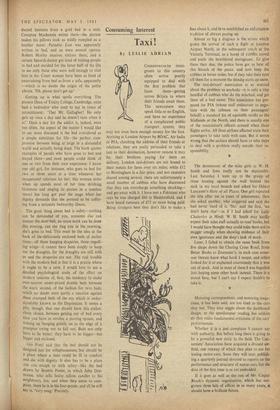Consuming Interest
Taxi!
By LESLIE ADRIAN
COMMONWEALTH
immi- grants to this country often arrive poorly equipped to deal with the first problem that faces them—getting across Britain to where their friends await them. The newcomers may speak little or no English, and have no experience of a complicated public transport system; they may not even have enough money for the fare. Arriving at London Airport by BOAC, Air India or PIA, clutching the address of their friends or relations, they are easily persuaded to take a taxi to their destination, however remote it may be; their brethren paying for them on delivery. London taxi-drivers are not bound to their meters for fares over six miles; while £12 to Birmingham is a fair price, and not excessive shared among several, there are unfortunately a small number of cabbies who have discovered that they can overcharge something shocking— and get away with it. I have met a Pakistani who says he was charged £60 to Huddersfield, and I have heard rumours of £75 or more being paid. Being strangers here they don't like to make a fuss about it, and ht ye established an unfortunate tradition of always paying up.
Almost as big a disgrace is the scrum which greets the arrival of such a flight at London Airport North, or the subsequent coaeh at the Victoria Terminal, as a horde of cabbies crowd and jostle the bewildered immigrants. fo give them their due, the police have got to hear of this breach of the peace, and now keep the cabbies in better order, but if they take their eyes off them for a moment the shindig starts up anew.
The taxi-drivers' association is as worried about the problem as anybody—it is only a tiny handful of cabbies who do the mischief, and get them all a bad name. This association has pre- pared for PIA (whose staff endeavour to nego- tiate with the cabmen on their passengers' behalf) a standard list of equitable tariffs to the Midlands or the North, and there is usually one of the association's officers around when these flights arrive. All three airlines affected warn their passengers to take taxis with care. But it seems wrong that the airlines should have to take steps • to deal with a problem really outside their re- sponsibility.
The demeanour of the sales girls at W. H. Smith and Sons really can be deplorable. Last Saturday I went up to the group of three leaning against the wall behind the desk in my local branch and asked for Osbert Lancaster's Here of all Places. One girl repeated the title after me in tones of amazement; then she asked another, who sniggered and said she had never 'card of it. 'No,' said the first, 'we don't have that'—as if I had asked for Lady Chatterley in Hindi. W. H. Smith may hardly expect their sales staff actually to read books, but I would have thought they could train them not to snigger smugly when showing evidence of their own ignorance and the shop's lack of stock.
Later, I failed to obtain the same book from five shops down the Charing Cross Road, from Better Books to Zwemmer's; in each case some- one literate knew what book I meant, and either looked for it or explained courteously that it was out of stock. And in most of them I was beguiled into buying some other book instead. There is a moral here, but I can't say I expect Smith's to take it.
Motoring correspondents, and motoring maga- zines, it has been said, are too kind to the cars they test. They may niggle about the dashboard design, or the speedometer reading but seldom do they make fundamental criticisms of the cars' performances.
Whether it is a just complaint I cannot say with authority. But before long there is going to be a powerful new critic in the field. The Con- sumers' Association have acquired a disused air- field, one runway of which they plan to use for testing motor-cars. Soon they will start publish- ing a quarterly journal devoted to reports on the performance and structure of motor-cars, but the date of the first issue is as yet undecided.
If it goes as well as the rest of Mr. Caspar Brook's dynamic organisation, which has out- grown three lots of offices in as many years, it should have a brilliant future.






































 Previous page
Previous page